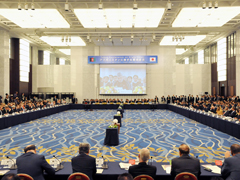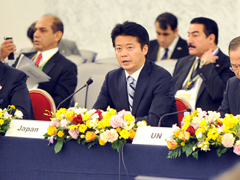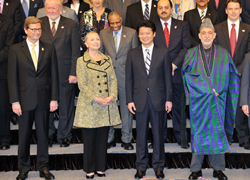Tokyo Conference on Afghanistan
(Summary and Evaluation)
July 8, 2012
(Japanese)
On July 8 (Sunday), the Japanese and Afghan Governments jointly held the Tokyo Conference on Afghanistan. A summary and evaluation of the conference are as follows. At the Conference, the Tokyo Declaration (ANNEX) was adopted.
1. Summary
(1) Participating countries and organizations
- Organizer:The Japanese and Afghan Governments
(Chaired by H.E. Mr. Koichiro Gemba, Minister for Foreign Affairs of Japan; H.E. Dr. Hazrat Omar Zakhilwal, Minister of Finance of Afghanistan; H.E. Dr. Zalmai Rassoul, Minister of Foreign Affairs of Afghanistan) - Major participants:H.E. Mr. Hamid Karzai, President of Afghanistan; H.E. Mr. Ban Ki-Moon, Secretary-General of the UN; H.E. Ms. Hillary Clinton, Secretary of State of the US; H.E. Mr. Laurent Fabius, Minister of Foreign Affairs of France; H.E. Dr. Guido Westerwelle, Federal Minister for Foreign Affairs and Deputy Chancellor of Germany; Rt Hon Mr. Andrew Mitchell MP, Secretary of State for International Development of the UK; the Hon.Bob Carr, Minister for Foreign Affairs of Australia; H.E. Mr. S. M. Krishna, External Affairs Minister of India; H.E. Ms. Hina Rabbani Khar, Minister for Foreign Affairs of Pakistan; H.E. Dr. Ali Akbar Salehi, Minister of Foreign Affairs of Iran, and delegates of 55 countries and 25 international organizations(including Afghan Civil Society Organizations, Afghanistan Chamber of Commerce and Industry, Confederation of Indian Industry (the organizer of Delhi Investment Summit on Afghanistan).
- In parallel with the Tokyo Conference, the following events were held: the Afghanistan Tokyo CSO Conference, Symposium hosted by the Japan International Cooperation Agency (JICA), Panel Discussion for the Promotion of Gender Equality hosted by the Japanese Cabinet Office, and a Symposium hosted by the UNHCR
(2) Conference Summary
At the Tokyo Conference, the international community aimed to address its strategic message and to commit to supporting development efforts of Afghanistan towards its self-reliance during the Transformation Decade (2015 ? 2024). To support this substantially, a partnership between the Afghan Government and the international community during the Transformation Decade was embodied. Mutual commitments and accountability of Afghanistan and the international community for the sustainable development of Afghanistan were clarified, and a mechanism under which this can be checked and reviewed on a regular basis was established (the Tokyo Mutual Accountability Framework).
Commitments by Afghanistan
- Afghanistan committed to implementing, effectively and with transparency, strategies for growth and development, based on paper Toward Self-reliance which details growth and development strategies throughout the Transformation Decade.
- Furthermore, Afghanistan committed to certainly implementing goals and indicators for the five areas of (1) Representational Democracy and Equitable Elections, (2) Governance, Rule of Law and Human Rights, (3) Integrity of Public Finance and Commercial Banking, (4) Government Revenues, Budget Execution and Sub-National Governance, and (5) inclusive and Sustainable Growth and Development, as well as their certain implementation.
Commitments by the international community
- At the Tokyo Conference, the World Bank presented the results of its provisional calculations of the yearly average fiscal gap to 2017, which was either approximately $3.3 billion or $3.9 billion per year depending on the two kinds of growth scenarios. The Afghan Government showed its own estimate of the average fiscal gap to 2020, which was approximately $3.9 billion.
- At the Conference, the international community committed to providing over $16 billion through 2015.
Contribution by Japan
- It was emphasized that since the Tokyo Conference in January 2002, Japan has played a leading role as the second largest donor behind the US in development assistance to Afghanistan, providing support totaling $3.3 billion till the end of 2011, across various areas including political processes, infrastructural improvement, basic human needs, industrial and agricultural development, and culture.
- Based on its past experience, Japan announced that it would provide up to around $3 billion of assistance to Afghanistan in about 5 years from 2012, in the field of socio-economic development and enhancement of security capacity, specifically stressing (1) agricultural sector, (2) infrastructure development and (3) human resource development. Japan expressed its intention to continue to provide contribution to the Afghan-led nation-building even after 2017 through assistance in those areas..
- In addition, in order to further strengthen regional cooperation between Afghanistan and its neighboring countries, Japan announced that it is implementing projects worth around $1 billion in neighboring countries, and through these projects it would support the development of the corridor which goes across Afghanistan from Central Asia to Karachi in Pakistan.
2. Evaluation
- (1) Since the International Conference on Reconstruction Assistance to Afghanistan (Tokyo Conference) was held in January 2002, Japan has been playing a leading role in providing support for Afghanistan. The Tokyo Conference on Afghanistan represented the culmination of a series of negotiations with the international conferences which started in the Bonn Conference in December 2011, and brought to a conclusion this year. Based on the discussions on security and regional cooperation at conferences such as the NATO Chicago Summit, the Regional Economic Cooperation Conference on Afghanistan (RECCA), and the Istanbul Process “Heart of Asia” Ministerial Conference, a specific path for sustainable growth in Afghanistan from 2015 was outlined at the Tokyo Conference, and a powerful strategic message, that Afghanistan would remain stable and be able to continue development beyond 2014, was delivered to the people of Afghanistan, as well as to the international community.
- (2) Japan took the initiative and secured high-level participation of the major donor countries such as India, Pakistan and Iran and international development organizations. Through long-term coordination efforts as a host nation, Japan was able to secure commitments from the international community for strong support totaling over $16 billion till 2015, as well as commitments from Afghanistan in the areas of development and governance. Japan also managed to demonstrate its presence in the international arena by newly establishing Tokyo Framework.
- (3) The result of the Tokyo Conference was that Afghanistan and the international community will enter into a concrete partnership with financial backing, under the newly formulated the Tokyo Mutual Accountability Framework Tokyo Framework. As the host nation of the said Conference, Japan will pursue follow-up efforts under its own initiative on the basis of the Tokyo Framework. It is important for Japan to continue playing a proactive and positive role with the international community in supporting Afghanistan.
![]() Tokyo Conference on Afghanistan
Tokyo Conference on Afghanistan
Back to Index



